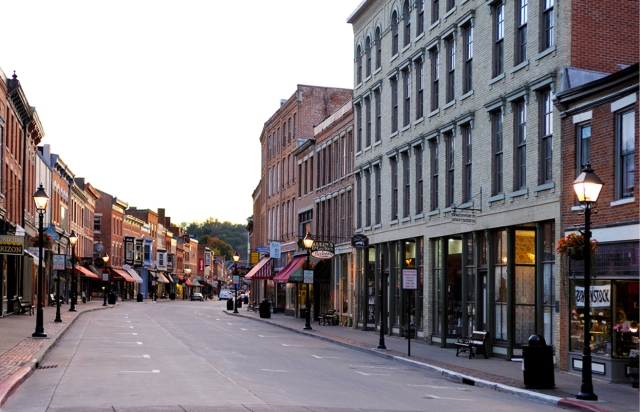It has rained incessantly since I arrived in Galena, Illinois, 48 hours ago. Just as I am leaving, I am granted a 10-minute reprieve, so I scurry like a crazed squirrel grabbing a few shots of the beautiful downtown historic district.
Back on the Mississippi Great River Road, after stopping at a river overlook and watching a pair of bald eagles spiral up from the misty valley below, I pull back onto the highway and surprise myself by turning north instead of south. It’s not confusion and it isn’t really a decision, it’s just my way of aimless traveling while on this 90-day journey of a raindrop – it’s just “surrendering to serendipity.”
It seems I’m headed to Sinsinawa, about 25 miles north and just across the state line into Wisconsin. All I know about the place, aside from loving the lyrical sound of the name, is that it is home to an order of Dominican Catholic Sisters who reportedly bake very fine bread. Once away from the tall bluffs that line the River, the sky clears and the land flattens out. Precisely cultivated rows, empty now of their bounty, stretch away to infinity on both sides of the road.
Sinsinawa Mound is a surprise – poking inexplicably above the tabletop of farmland around it. It seems, however, perfectly suited to be the home of Sisters pledged to a higher calling. I drive the quiet, shaded campus without seeing anyone and I am not moved to stop until I come upon a cemetery. A s I walk among the long, orderly rows of simple white headstones, reading the names of the Sisters, I wonder about the stories of their lives.
On a small rise just beyond the cemetery, there is a brick pattern of concentric circles that I recognize as a labyrinth. A sign invites anyone to follow the path to the center while praying or meditating. I do, and when I stand in the innermost circle, there is a heightened awareness of all things being in perfect order. Refreshed and content, my visit seems complete.
Just as I reach my car, I hear someone say, “Come over here, will you, and help me a moment.” It’s a voice your mother might have used, or your third grade teacher – respectfully assuming that you will, of course, come immediately and do the right thing. I see her then – a petite woman with curly gray hair, standing beside an upturned bench. “This bench has blown over in the wind,” she says, “and we must set it upright.”
When our chore is complete, she beams up at me with an elfish grin and introduces herself as Sister Janette. We chat a few minutes, then sit together on the bench as she tells me about her community of Sisters and about her job here as the librarian. It turns out that while the Dominican Sisters of Sinsinawa are indeed bakers of bread, they are also bold activists who go wherever they are needed in the world to confront injustice. Since 1847, this order of more than 3,200 courageous women has fearlessly and quietly worked to eliminate racism, human trafficking and any behavior that impinges on human dignity.
Sister Janette’s eyes sparkle as she talks and I feel her spunk and her quiet effervescence. There is a river of subtle, but irrepressible, joy in her that bubbles frequently to the surface in contagious laughter. When I tell her about the 90-day journey of a raindrop, she is so delighted that it makes us both giggle. She asks about places I have been and what lies ahead, relishing each answer. She is, as my grandmother would have said “just plain tickled with the whole idea.” We laugh and talk like old friends, catching up on each other’s lives.
When I give Sister Janette a postcard of the journey, she looks at it quietly for a long time. Finally, she looks up with glowing eyes and says, “You know, Gayle, today is my birthday. This card and this time with you is my birthday present.” The smiles that we share then make my heart feel like it could burst. So this is why I had come – to help a friend celebrate her birthday.
I give her a birthday hug then and ask if I may take her picture. She answers in that “teacherly” no-nonsense voice that leaves no space for disagreement, “Yes, of course. But I shall be holding the postcard.”


